Federal Conservatives lead by 9 in Newfoundland and Labrador
September 28, 2023
From September 19 to 25, 2023, Abacus Data conducted a representative online survey of 500 adults living in Newfoundland and Labrador. The survey asked questions about both federal and provincial politics. This is the first report looking at federal politics in the province. On Monday, we will look at the state of provincial politics in the province.
If a federal election was held today, the federal Conservatives would get 42% of the vote in Newfoundland and Labrador with the Liberals at 33% and the NDP 23%. Compared with the 2021 election results, this represents a 15-point drop for the Liberals, a 9-point gain for the Conservatives, and a 6-point gain for the NDP.
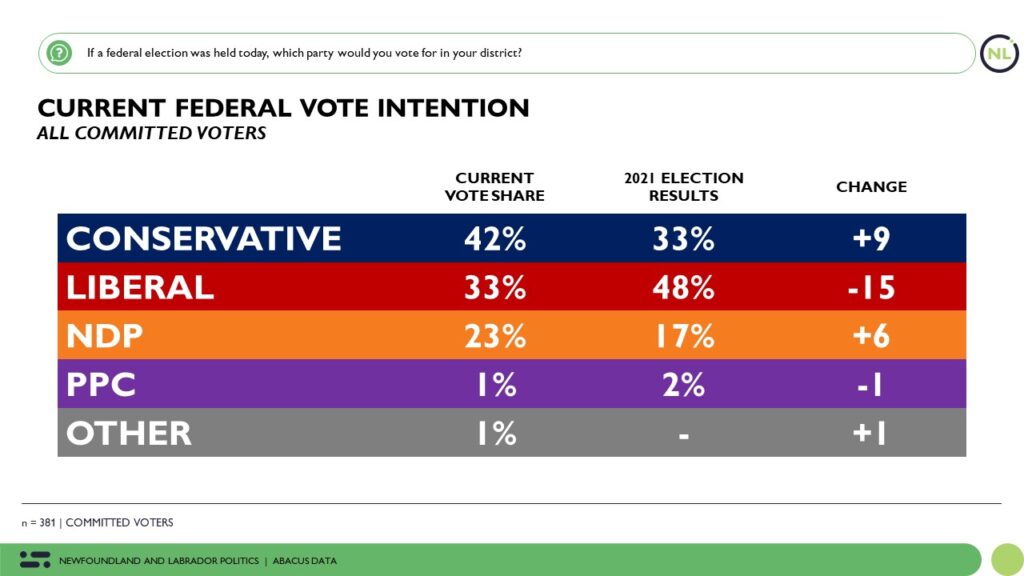
The Conservatives are well ahead in eastern and central Newfoundland, are tied with the Liberals in western Newfoundland and Labrador, and are slightly ahead of the NDP on the Avalon Peninsula and in St. John’s. The Conservatives are ahead among those aged 18 to 29 and 45 to 59, and statistically tied with the other parties among those aged 30 to 44. The Liberals lead by 14-points among those aged 60 and over.
Among me, the Conservatives lead by 18 while the Liberals, Conservatives, and NDP are in a tight three-way race with women.
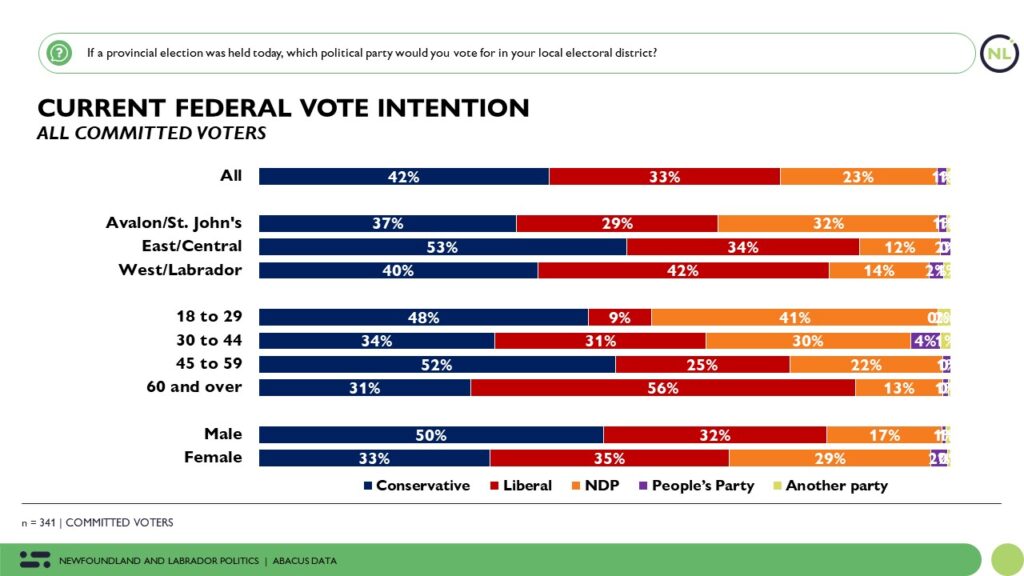
The Conservative lead across the province is based on several factors.
First, the federal government’s net approval rating is -23 with 26% approving and 49% disapproving. Most worrisome for the federal Liberals, those who strongly disapprove are nine times more likely than those who strongly approve (28% vs. 3%).
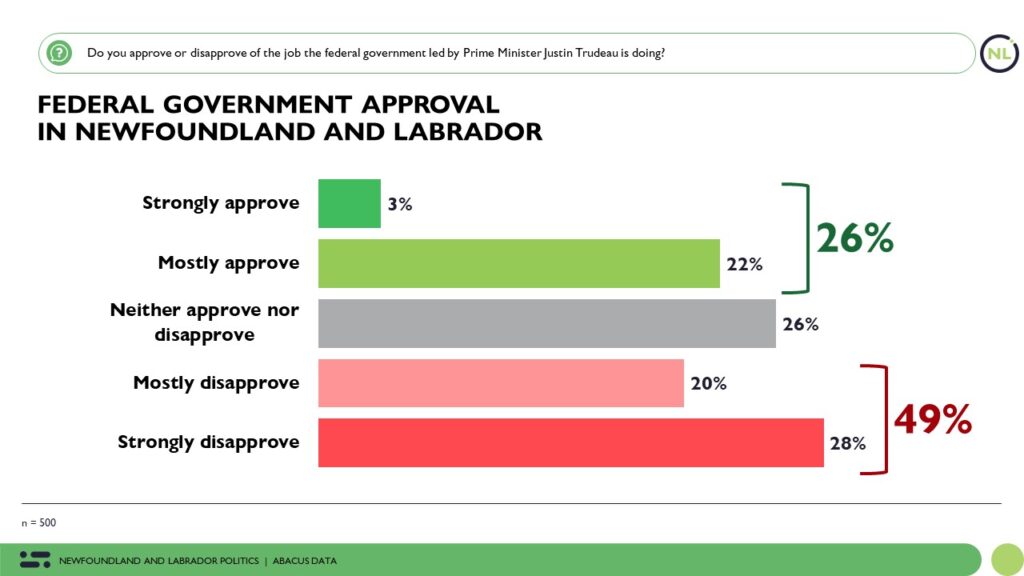
Second, Justin Trudeau is by far the least popular leader in the province. 50% have a negative view of the Prime Minister compared with 29% who have a positive view (net = -20). This is slightly better than the national average for the Prime Minister, but not substantially so.
In contrast, NDP leader Jagmeet Singh’s net favourable rating is +20 (40% positive and 20% negative) while Conservative leader Pierre Poilievre has about equal numbers viewing him favourably and unfavourably (positive 33% vs. negative 34%).
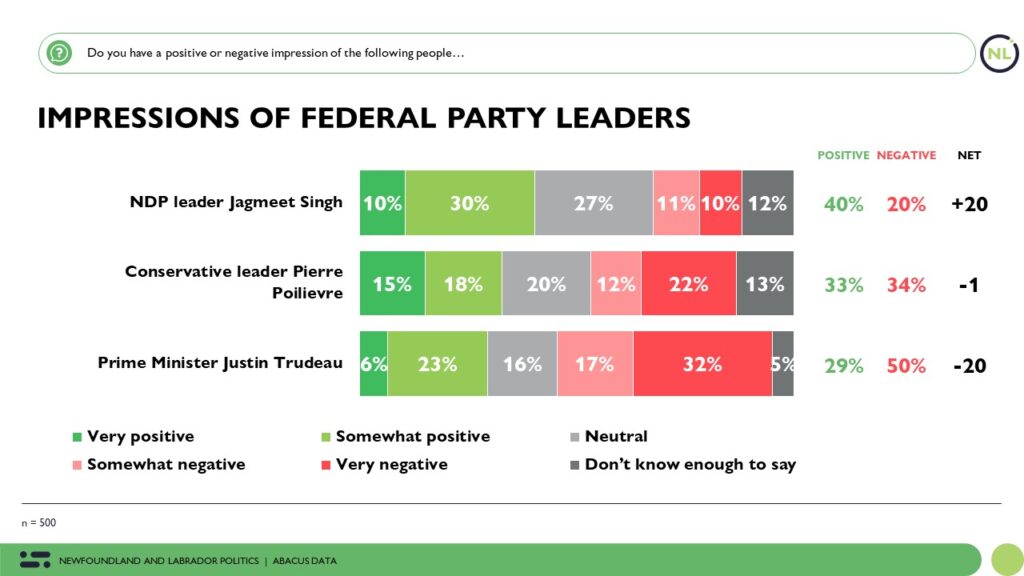
The two federal cabinet ministers in NL have better net favourables than the Prime MInister. Seamus O’Regan is at +6 (32% positive vs. 26% negative) while Minister Gudie Hutchings is at -6 (18% positive vs. 24% negative). Minister O’Regan is more widely known than Minister Hutchings.
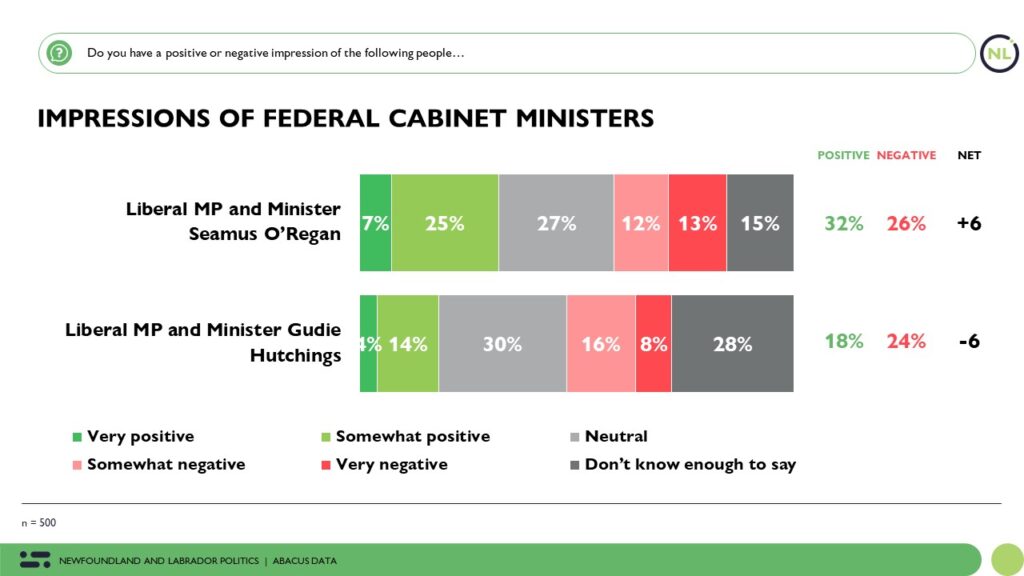
The top issues in the province are overwhelmingly the cost of living and healthcare. When asked to select the top three issues facing the province, 84% select the cost of living, 74% select healthcare, and 43% select housing affordability.
Cost of living is a top issue because so many residents are either living paycheque to paycheque or falling behind.
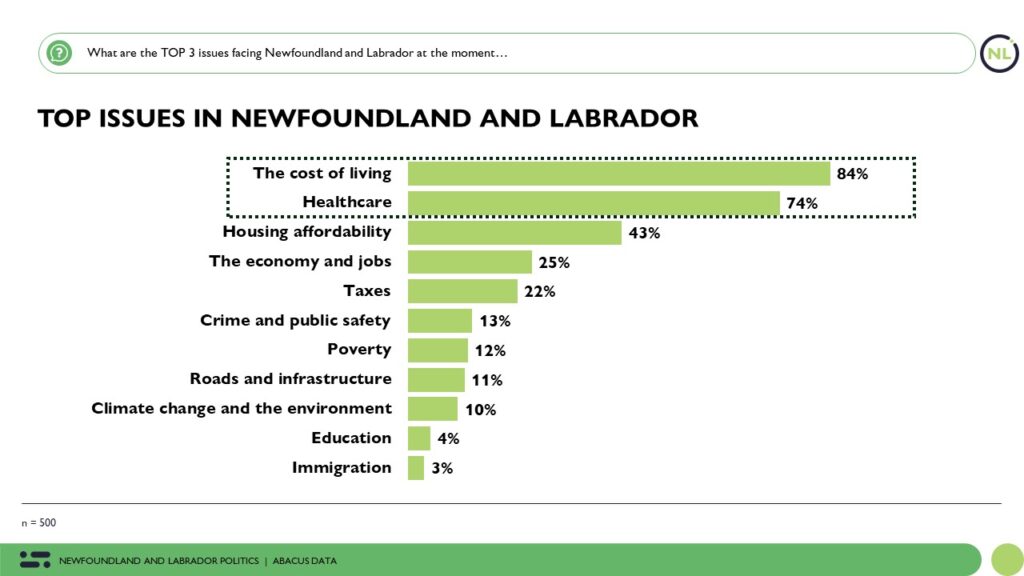
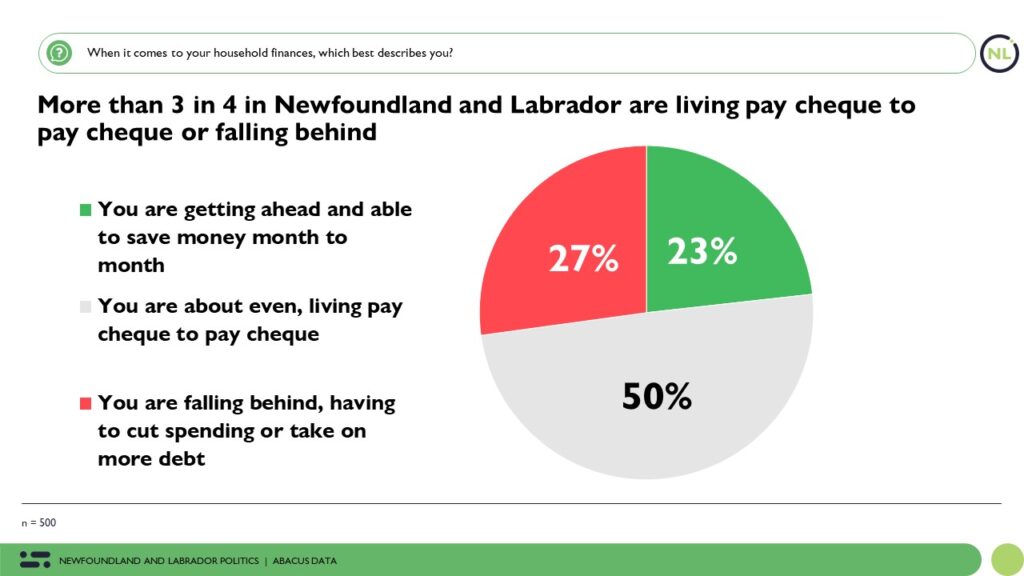
When asked to rate the federal government’s performance in several policy areas, evaluations were mixed when it comes to climate change, growing the economy, and improving roads and infrastructure. But on housing and the cost of living, about 3 in 4 NL residents say the federal government has done a poor job or a very poor job on those two issues.
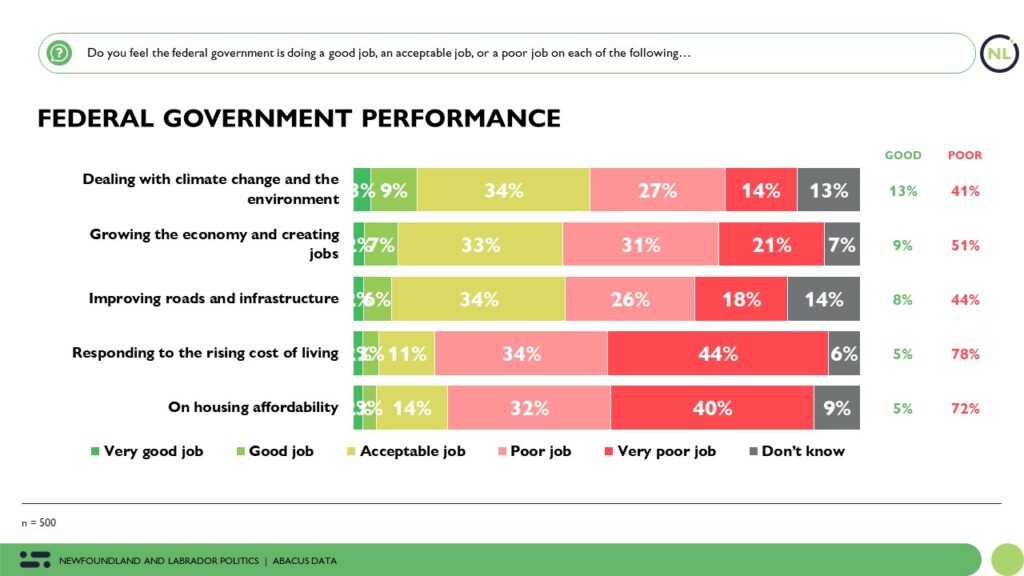
When asked specifically what is to blame for the rising close of living, NL residents point to multiple factors, but far more believe companies charging more to make more profits deserves much of the blame. Decisions by the federal government and Prime Minister Trudeau, global supply chain shortages, and the pandemic are also frequently cited as major factors. Only 1 in 5 NL residents think decisions made by the provincial government and Premier Andrew Furey are to blame a lot.
When asked which factor is most to blame, 36% blame companies charging more to make more profit, 31% blame decisions by the federal government and Justin Trudeau., 16% blame the COVID-19 pandemic while only 3% blame decisions by the provincial government.
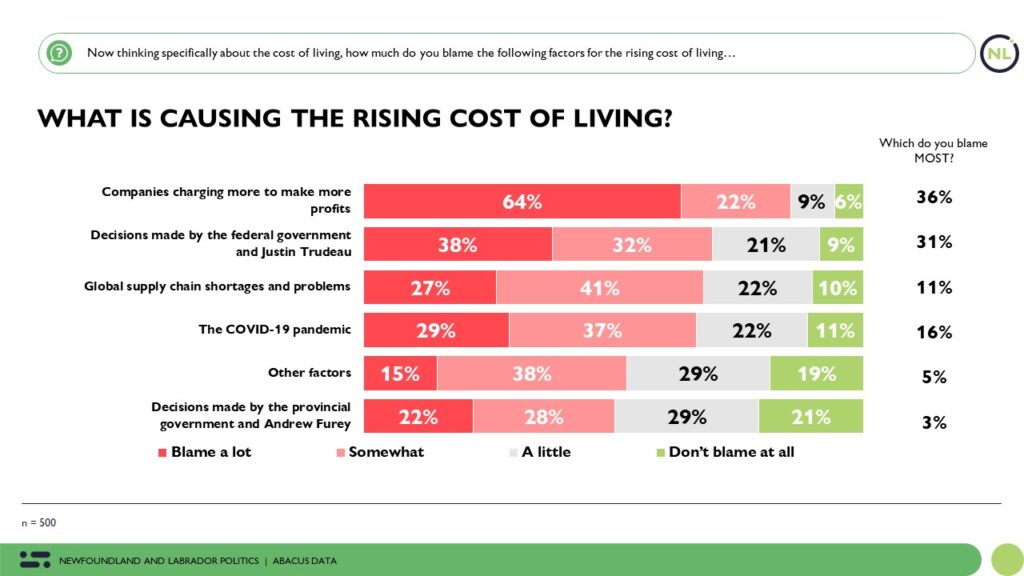
Not surprisingly there is a strong correlation between voting intention and blame. Liberal and NDP voters are more likely to blame companies raising prices to make more profit and the pandemic or global supply chain shortages. Interestingly, only 18% of NDP supporters blame the federal government for the rising cost of living compared with 60% of Conservative supporters who feel the same way.
The Upshot
According to Abacus Data Chair & CEO David Coletto: “The federal political landscape in Newfoundland and Labrador mirrors the mood and opinions of Canadians across the country. Impressions of the federal government’s performance overall, its performance on key issues, and how people feel about the Prime Minister are overly negative. This, along with fairly positive impressions of Pierre Poilievre have created an environment where the Conservatives now lead the Liberals. The last time the Conservatives (or a conservative party) won the popular vote in Newfoundland and Labrador was in 1984 during the Mulroney landslide win.
It’s clear the cost of living is the focus for most voters in the province. Many blame the federal government the most for the rising cost of living and even those who don’t believe the federal government and Trudeau haven’t handled the issue well.
The weakness of the federal Liberals in what has been a consistently strong province for the party federally and the remaining province governed by Liberals provincially underscores just challenging the environment is for them today.”
Subscribe to David’s Substack to get deeper insights into what’s happening in Canadian politics.
Methodology
The survey was conducted with 500 adults living in Newfoundland and Labrador from September 19 to 25, 2023. A random sample of panelists were invited to complete the survey from a set of partner panels based on the Lucid exchange platform. These partners are typically double opt-in survey panels, blended to manage out potential skews in the data from a single source.
The margin of error for a comparable probability-based random sample of the same size is +/- 4.5%, 19 times out of 20.
The data were weighted according to census data to ensure that the sample matched Newfoundland and Labrador’s population according to age, gender, educational attainment, and region. Totals may not add up to 100 due to rounding.
This survey was paid for by Abacus Data Inc.
Abacus Data follows the CRIC Public Opinion Research Standards and Disclosure Requirements that can be found here: https://canadianresearchinsightscouncil.ca/standards/
ABOUT ABACUS DATA
We are the only research and strategy firm that helps organizations respond to the disruptive risks and opportunities in a world where demographics and technology are changing more quickly than ever.
We are an innovative, fast-growing public opinion and marketing research consultancy. We use the latest technology, sound science, and deep experience to generate top-flight research-based advice to our clients. We offer global research capacity with a strong focus on customer service, attention to detail, and exceptional value.
We were one of the most accurate pollsters conducting research during the 2021 Canadian election following up on our outstanding record in 2019.
Contact us with any questions.
Find out more about how we can help your organization by downloading our corporate profile and service offering.



